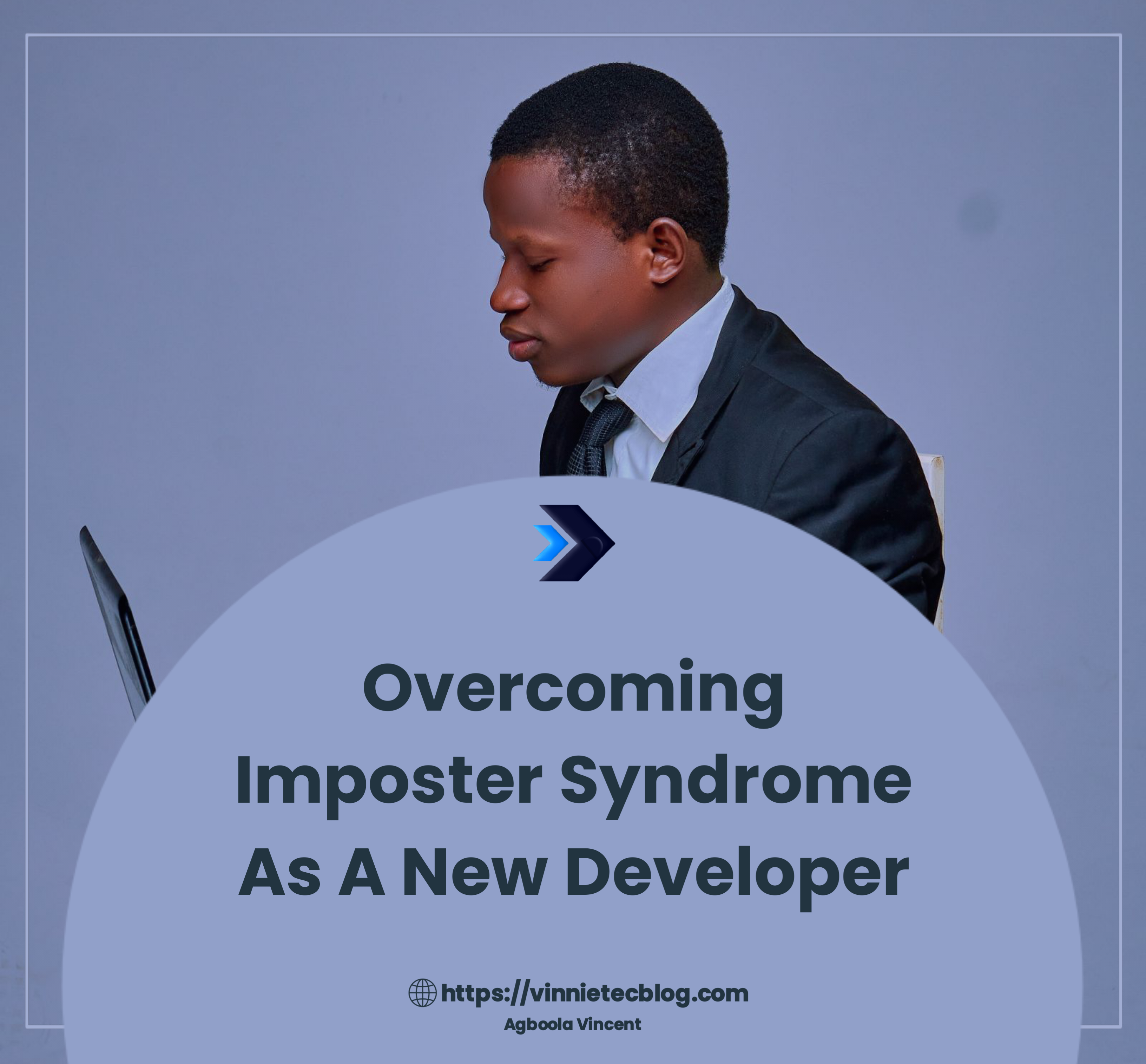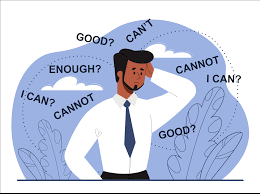How to Overcome Imposter Syndrome as a New Developer
 Agboola Vincent
Agboola Vincent
You’ve just started your journey as a developer, but there’s a voice in your head whispering, “Do I really belong here?” Or, “Am I even good enough to be here?”

That’s imposter syndrome, a common feeling among new developers that makes you doubt your skills and question your place in the tech world☹. It’s the fear that you’re not as competent as others think you are and that it’s only a matter of time before you’re exposed, this feeling keeps hovering over your enthusiasm, asking you to prove yourself.☹
Imposter syndrome is widespread in the tech industry, especially among those just starting out. Many developers, from beginners to experienced professionals, have experienced it at some point in their careers. You’re not alone in feeling this way, many successful developers have felt the same, and it’s important to recognize that these doubts are part of the learning process.
Purpose of the Article
The purpose of this article is to offer practical advice and share experiences to help you overcome imposter syndrome. And I believe by the end, you’ll have tools to build confidence in your skills and understand that self-doubt is normal but doesn’t have to hold you back.
Let’s get started!
What is Imposter Syndrome?
Imposter syndrome is simply the feeling that you’re not as capable or skilled as others think you are, and that you don’t deserve the success you’ve achieved.

You feel like you don’t really deserve the success you’ve achieved, even though you’ve worked hard for it. It’s like you’re wearing a mask, and you’re worried that any moment someone will pull it off and say, “Hey, Guy, you don’t belong here!” You might often feel like a fake or worry that you’re not as smart or capable as others think you are.
People with imposter syndrome often experience self-doubt. You might feel like you’re just lucky, and sooner or later, everyone will realize you’re not as skilled as they thought. Even when you do something well, it’s hard for you to accept that you did a good job. Instead, you might think, “I just got lucky” or “Anyone could have done that.”
Why New Developers Are Prone to It
As a new developer, it’s normal to feel overwhelmed. There’s so much to learn, and the learning curve is steep and challenging.
You’re stepping into a world where it seems like everyone else knows more than you, and that can be intimidating. It’s easy to just start comparing yourself to others who have been coding for years, and you might think, “I’ll never be as good as them.”
Yes, the tech industry moves fast, with new tools and technologies coming out all the time. This can make you feel like you’re always behind, trying to catch up with everyone else.
It’s like running a race where the finish line keeps moving further away. This constant pressure can make you feel like you’re not good enough, even when you are making progress.
But here’s the reality, every experienced developer was once a beginner, just like you. They’ve made mistakes, learned from them, and grown over time. It’s okay to be where you are right now. You don’t have to know everything immediately. Learning takes time, and it’s a journey everyone goes through. The important thing is to keep moving forward, even if it’s one small step at a time.
Let me share a bit of my personal story
So when I started my journey as a developer some years back then, I felt like I had walked into a room, full of experts, while I was still trying to figure out the basics. I vividly remember my first project. It was after a video course I started with then on HTML and CSS by Traversy Media on YouTube, spent hours watching the tutorials and then replicating it on my PC, but as time went on, after reviewing my code a few hours or days later, I started to feel the excitement I felt while building the project began to fade, and doubts crept in.
Despite having followed the course carefully, I couldn’t discredit the feeling that I didn’t really understand what I was doing. It was as if the knowledge I had gained was only superficial. Every time I looked at my code or was asked to explain something, I felt like I was just one step away from being exposed as not competent enough. I questioned why I needed to keep going back to my notes instead of having everything memorized.
It felt like I should have mastered this by now, and the fact that I still needed to review my notes made me doubt my own learning. I kept wondering, “Am I really grasping this, or am I just pretending to know what I’m doing?”
The constant second-guessing and self-doubt were exhausting, making it hard to trust my own abilities. ☹
But as time went on, I began to see that these feelings were just part of the learning process. I realized that learning involves a lot of ups and downs. Going back to my notes wasn’t a sign that I was failing… it was just part of getting better.
I started to understand that imposter syndrome didn’t mean I wasn’t good enough, it meant I was stretching my limits and growing. With this new perspective for me, I began to feel more confident and watched my skills and self-assurance improve over time.
Many well-known developers have talked about their own struggles with imposter syndrome as well.
For example, John Carmack, who is famous for creating games like Doom and Quake, has shared that even with his impressive achievements, he sometimes felt like he wasn’t good enough. He admitted that despite his success, he often wondered if he was just faking it. He tweeted on X ten years ago, he said, ‘I feel a touch of imposter syndrome when I get invited to speak at functional programming conferences.’
Ada Lovelace, a mathematician and a pioneer in computing, also faced self-doubt. Even though she made significant contributions to early computing, she had her own moments of uncertainty. Her story shows that even those who have made groundbreaking contributions to technology can still feel like they don’t measure up.
These stories remind us that imposter syndrome is something that affects many people, even those who are highly successful.
Knowing that others, including some of the most respected figures in tech, have dealt with similar feelings can be comforting. It helps us understand that these doubts are a common part of the journey and that overcoming them is possible.
Practical Tips for Overcoming Imposter Syndrome

I use the Acronyms of the word ACTIONR to summarize all and make it easier to remember
🔶 Acknowledge and Accept — First, you have to know, it’s okay to feel like an imposter sometimes. Recognize and accept these feelings without beating yourself up, I mean without judgment. Just like finding a bug in your code, noticing and accepting these feelings is the first step to handling them. Acceptance helps you start working through your doubts and manage them effectively and also allows you to move forward with a clearer mind and more focused approach.
🔶 Continuously Learn and Leverage — Focus and continuously expand your skills by enrolling in online courses, attending workshops, and participating in coding challenges. All this ongoing learning process ensures that you stay updated and confident in your abilities. Each new skill you acquire adds to your toolkit and boosts your confidence. Like I love saying, knowledge boosts one’s confidence.
🔶 Target Realistic Goals and Celebrate — Break down large goals into smaller, achievable tasks, and set realistic deadlines for each. Celebrate every small victory along the way to recognize your progress and maintain motivation.
🔶 Invest in Mentorship and Community — Seek out a mentor who can offer guidance and support, and join a community of developers to share experiences and get feedback. Having someone to guide you or share experiences with can be really helpful. It’s reassuring to know that others have been where you are and can offer advice and encouragement. Don’t hesitate to reach out for support.
🔶 Optimize Your Mindset — Transform negative thoughts into positive, constructive feedback. Instead of viewing mistakes as failures, see them as opportunities for learning and growth. When you catch yourself thinking negatively, try to turn it around. For instance, if you think, “I’m not good enough,” change it to, “I’m still learning and improving.”
It’s like turning a setback into a setup for a comeback. So adopting a growth mindset helps you maintain a positive attitude and reduces self-doubt.
🔶 Nurture Knowledge by Sharing — Share what you’ve learned with others by writing blog posts, creating tutorials, or helping with projects. Teaching others not only reinforces or supports your own knowledge but also highlights your valuable skills and boosts your self-esteem. And as you share, you also keep solidifying your own understanding.
🔶 Record and Revisit Achievements — Maintain a detailed record of your accomplishments and revisit it when self-doubt arises. Whether through a portfolio or a success journal, documenting your achievements provides tangible evidence of your capabilities, reminds you of your progress and builds your confidence.
Building Long-Term Confidence
We’ve tackled some practical tips for overcoming imposter syndrome to solidify your newfound confidence.
Think of this section as the next level in your personal development journey.
It’s all about creating a strong foundation that helps you stay resilient, motivated, and positive as you continue on your coding journey. Building long-term confidence isn’t just about overcoming the occasional competition of self-doubt, more than that, it’s about establishing habits and mindsets that keep you moving forward, no matter what challenges come your way.
Now, let’s explore some simple yet powerful strategies to build and sustain your confidence as you grow in your coding career
🔶 You Always Embrace Failure as Part of the Process
We’ve all been there, staring at a screen, wondering how in the world our code could be so wrong. But here’s the deal, failure is an essential part of learning. It’s not a sign that you’re failing at being a developer, it’s a sign that you’re learning and growing. Even the biggest names in tech had their fair share of missteps, I shared mine and some earlier, remember?
And did you even know that Microsoft’s first version of Windows had plenty of bugs and issues? But those setbacks helped shape the robust operating system we use today. So when you hit a snag, think of it as a stepping stone rather than a stumbling block.
🔶 You Always Develop a Growth Mindset
Imagine approaching each challenge with the attitude of a daring discoverer rather than a discouraged dweller. That’s the power of a growth mindset. Instead of seeing difficulties as barriers, view them as chances to learn and improve. Carol Dweck’s book, Mindset: The New Psychology of Success, is a great read to help shift your perspective. And for getting tech-specific tips, check out The Pragmatic Programmer by Andrew Hunt and David Thomas, it’s filled with practical advice for seeing challenges as growth opportunities. Just know that it’s not always about being the best, it’s about being better than you were yesterday.
🔶 Surround Yourself with Positivity
The tech world can sometimes feel like a never-ending competition, but it doesn’t have to be.
Imagine your coding environment as a garden, you want it to be filled with positive influences that help you flourish, right?
Follow developers who inspire you, join supportive communities, and sidestep negativity. Engaging with positive, like-minded people can make all the difference. Platforms like Dev.to or friendly subreddits can offer encouragement and valuable insights.
Remember, comparing yourself to others can lead to frustration, instead, focus on your own progress and celebrate every milestone, no matter how small.
🔶 Regularly Reflect on Your Journey
In the rush to learn the next big framework or to push your code to production, it’s easy to forget just how far you’ve come. That’s why it’s important to regularly hit the pause button and reflect. Think back to where you started and look at where you are now. Each step forward is a victory worth celebrating.
Setting aside time for self-reflection doesn’t just boost your confidence, it helps you plan your next steps clearly. Whether it’s journaling, blogging, or simply taking a walk to ponder over your progress, these moments of reflection can be the most empowering part of your journey.
CONCLUSION
As I wrap up this article, let’s revisit the key strategies I’ve explored.
I’ve outlined several effective methods to address and manage these feelings of self-doubt. These include recognizing and celebrating your achievements, setting clear and realistic goals, seeking support from peers and mentors, and understanding that learning and growing are part of the journey.
Remember, imposter syndrome is a common experience, especially for those new to the field. It’s important to know that these feelings are normal and don’t reflect your true abilities or potential.
Gaining confidence is a gradual process that involves practice and persistence. Be kind to yourself, and keep moving forward, knowing that each step you take is progress.
I encourage you to share your experiences and strategies for overcoming imposter syndrome in the comments or on my social media.
Your insights could be invaluable to others who are facing similar challenges.
Keep believing in yourself, stay committed to your journey, and celebrate every milestone, no matter how small. You’ve got this.
Thanks for reading, and here’s to your continued success!!!
Article is originally published here
Subscribe to my newsletter
Read articles from Agboola Vincent directly inside your inbox. Subscribe to the newsletter, and don't miss out.
Written by

Agboola Vincent
Agboola Vincent
I’m a Full Stack Web Developer and Software Engineer focused on creating clean, efficient, and user-friendly digital solutions. I specialize in both front-end and back-end development, turning ideas into functional, well-crafted websites and applications. Aside from coding, I’m also a Mathematics Enthusiast, a Mentor, Coach, and a follower of Christ. Feel free to connect via [https://www.linkedin.com/in/agboola-vincent] or reach out via email at [vinnietec.blog@gmail.com] Let’s connect to explore how I can help bring your vision to life.